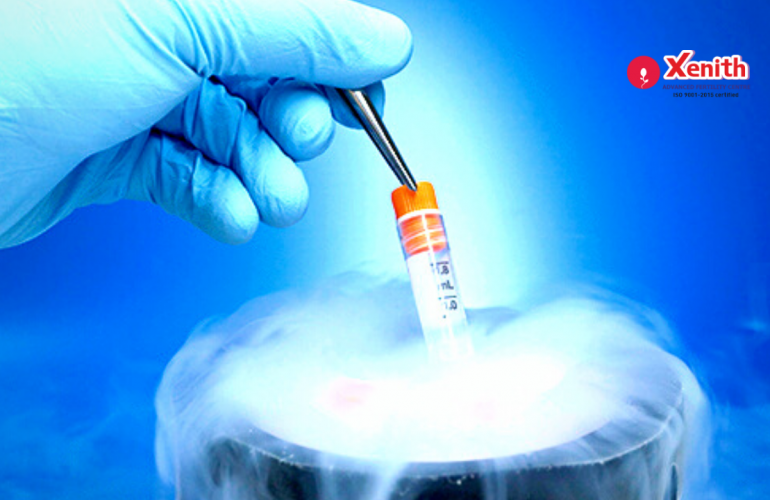Infertility is as common in men as it is in women. If you have been trying to conceive for more than a year, it is just as likely to be a male problem as it is a woman’s problem. About 40% of infertility cases are related to male causes; another 40% can be related to female infertility causes; 20% of infertility cases are due to both male and female causes.
The essentials men need to achieve pregnancy
In order to have a successful pregnancy from the male perspective, there are a few things that are needed.
- Healthy sperm. At least one of your testicles must be functioning correctly in order to produce sperm. But it is not enough just to produce sperm. Healthy sperm is needed for pregnancy. The body must produce testosterone and other hormones to trigger and maintain healthy sperm production.
- Sperm needs to be transported. Sperm is produced in the testicles. It is then transported by tubes called vas deferens until they mix with semen and ejaculate out of the penis.
- Enough sperm must be produced. If the sperm count is low, it can lower the odds of fertilizing an egg. A low sperm (oligospermia) is considered to be fewer than 15 million sperm per millimeter of semen.1 Sperm could be absent and this condition is known as azoospermia.
- Sperm must have good motility. If sperm are not able to swim or have poor movement (motility), it is difficult for them to travel up to the fallopian tube to fertilize an egg.
- Sperm must have a healthy shape (morphology). Normal sperm have oval heads and long tails that propel motion. This is nearly as important as the volume of sperm or motility, and more sperm with a normal structure can increase the chances of achieving pregnancy.
What could cause male infertility?
Male infertility could be due to various reasons including problems like the ones mentioned above. It could also be linked to several other causes such as:
- An injury that prevents sperm from being released such as an injury to the spinal cord or testicles
- Diseases or medical conditions such as varicocele, a common but reversible cause of male infertility
- Hormonal imbalances can impact sperm count, sperm motility, or sperm morphology
- medications
- The National Institutes of Health lists the following lifestyle choices associated with male infertility: smoking cigarettes, alcohol intake, use of illicit drugs, obesity, psychological stress, advanced paternal age, dietary practices, and coffee consumption.2
- Certain medications can affect sperm production, function and delivery. These may include medications for arthritis, depression, digestive issues, epilepsy, and infections.
What are the signs or symptoms of infertility in men?
Without a clinical diagnosis, it can be hard to tell if a man is infertile. There are no tell-tale signs unless there is a problem in the physiology of the male organs. In most cases, male infertility is often without symptoms and is not diagnosed until issues with conception arise. However, some of the common signs of male infertility could be:
Pain and swelling in the testicles
Testicular pain and swelling could be localized in one area or generalized around the groin. It can be caused by injury, infection, or a varicocele which is swelling of the veins within the scrotum.
Ejaculation and orgasm problems
Problems with reaching orgasm and ejaculating normally, could be a sign of male infertility. There are 3 types of ejaculation problems: premature ejaculation, delayed ejaculation and retrograde ejaculation. These can be due to thyroid problems, injury, diabetes, depression, stress, anxiety, certain medication. Erectile dysfunction, the inability to achieve and maintain an erection, can also be an issue in such cases.
Low sexual desire
Over the course of life, sexual interest can wax and wane intermittently in men. In some cases, low libido, or low sexual drive, can be a temporary issue caused by relationship problems or stress at work. Persistently low sexual drive can put a strain on relationships and may be related to an underlying medical condition.
Being overweight or obese
Obesity in men is associated with lower testosterone levels, poorer sperm quality and reduced fertility as compared to men of normal weight. However, this effect is often reversible by shedding the extra weight.
Smaller-sized testicles
Men with smaller than normal testicles suffer from a congenital disorder known as Klinefelter’s syndrome where instead of XY chromosomes normally found in men, there is XXY chromosomes. Due to the smaller testicle size, they do not produce enough testosterone which is needed for the development of male characteristics.
Undescended testicle
This occurs when the testicle hasn’t moved into the scrotum before or after birth. Testicles need a cooler environment like the scrotum to function normally. This can lead to fertility problems later on in life.
Most men have adequate and healthy sperm to fertilize their partner’s eggs even if they are unable to do so during sexual intercourse. In such cases, we employ other methods for the egg and sperm to meet such as assisted reproductive technologies like IUI, Intracytoplasmic Sperm Injection (ICSI) or Microsurgical Sperm Retrieval. In today’s modern age, infertility is mostly a thing of the past! If you suspect any signs of male infertility, visit us at Xenith Advanced Infertility.




